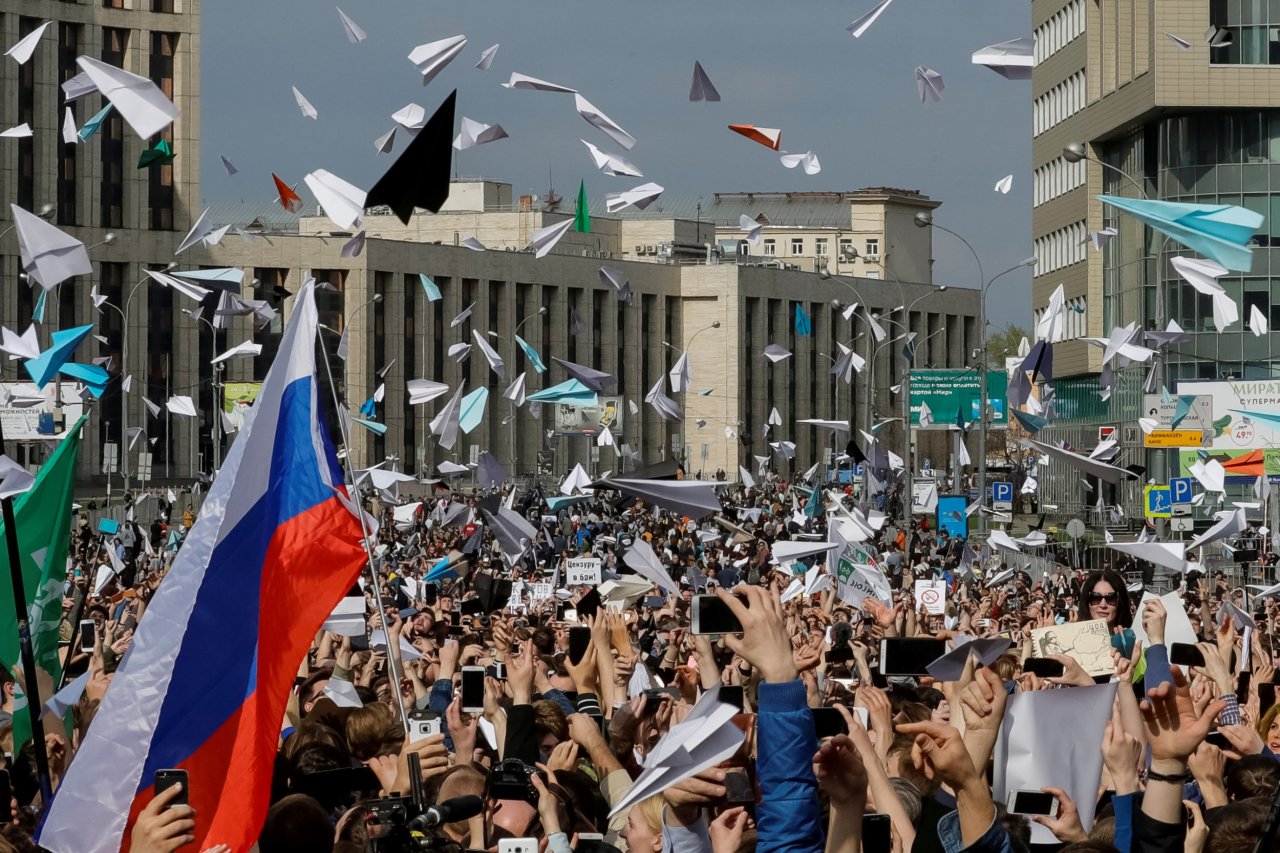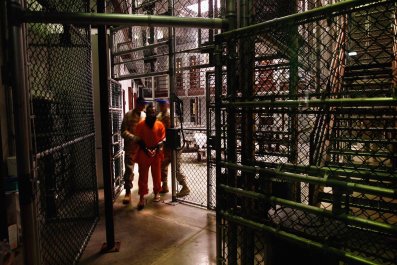China has its own great firewall. Turkey has been blocking swaths of the internet, including YouTube, for at least a decade. So until last month, Russia was a glaring standout among authoritarian nations in allowing its people relatively free access to the World Wide Web.
No longer. In what is shaping up to be a historic showdown, the Russian state has mounted its first major assault on cyberfreedom. On April 15, Russian internet regulator Roskomnadzor (RKN) began trying to block Telegram, a secure messaging service and blogging platform used by more than 15 million Russians. Its crimes? Refusing to comply with a new law that obliges all internet companies to physically store their data on Russian users in the country, and failing to hand over secure "keys" to enable secret police to read encrypted messages.
Even if Telegram had wanted to comply, it couldn't; the platform provides encryption between one user and another, preventing Telegram from hacking into its own messages. Still, it is Russia's "first huge act of censorship," says Ilya Andreev, co-founder of Estonia-based Vee Security, a software company that has been helping Telegraph users bypass the ban. "The government has been blocking small [internet] resources since 2014," he adds. If RKN succeeds with this block, "worse [ones] will come."
The data law is among a slew of new government rules regulating the internet, ostensibly in response to alleged terrorists' prolific use of encrypted communications. In reality, Russia's Federal Security Service, or FSB, has been using its access to data on social networks to arrest ordinary users for posting—or even liking—opposition-related content.
At least seven were imprisoned in 2017. In early April, state prosecutors in the Siberian city of Krasnoyarsk demanded an 18-month prison sentence for opposition activist Oksana Pokhodun for the crime of storing satirical memes about Ukraine, priests and President Vladimir Putin on her personal page on vKontakte, a popular Russian social media site. A supporter of opposition leader Alexei Navalny in the city of Pskov has been charged with "Nazi propaganda" for posting an archive photograph of an Orthodox priest shaking a Nazi soldier's hand in front of a Nazi flag.
"Ironic comments about Putin, news of corrupt of officials, anything about Ukraine that portrays them as ordinary people [and] not crazy fascists, as our government tells us—pretty much anything you post can be viewed as support of terrorism," says Sergei Volkov, a 23-year-old Navalny activist from Moscow.
Telegram, unlike vKontakte, refused to allow the government access to its users' data. As a result, it quickly became a refuge not only for activists but for millions of ordinary Russians who wanted to share information freely without the risk of prosecution. The service was also popular with many senior Russian politicians, who used the company's Twitter-style news channels to communicate with tens of thousands of followers.
RKN's attempted Telegram block, however, quickly degenerated into farce. To get around the ban, Telegram borrowed a technique pioneered by Zello, a much smaller app: As soon as RKN blocked an existing internet service provider, Telegram switched to another one. Over nearly two weeks of this virtual whack-a-mole game, RKN blocked over 19 million internet protocol addresses, but Telegram always remained one step ahead, tirelessly borrowing IP addresses across the internet, including some from Microsoft, Google and Amazon Drive.
Telegram stayed up, and so has Zello. But as RKN tried to shut down Telegram, thousands of other sites suffered collateral damage. Because of RKN's wholesale shutdown of platforms that Telegram was using, Russians found they could not buy airline tickets, access Google products like Maps or Gmail, transfer or withdraw money, use Spotify or Amazon Web Services, purchase insurance policies or play online games. By April 25, RKN had received 42,000 complaints of disrupted website service, which were dismissed out of hand as "not containing correctly formulated complaints."
"Thank you Apple, Google, Amazon, Microsoft—for not taking part in political censorship," wrote Russian entrepreneur Pavel Durov, 33, the founder of both Telegram and vKontakte, on his personal Telegram channel. "I'm thrilled we were able to survive under the most aggressive attempt of internet censorship in Russian history." Durov also called for Telegram supporters to throw paper airplanes with messages on them out of their windows on April 22 to signal their support. That protest landed at least one activist, Maria Alyokhina, a member of punk protest group Pussy Riot, in police custody.
Two weeks into the ban, Telegram claimed that its active base, had shrunk by only 3 percent. Naturally, state-owned media-monitoring website Medialogia reported a much larger figure, 76.5 percent. Whatever the real number is, the showdown has turned into a test of strength between the Russian state and tech-savvy citizens. For the time being, the internet is winning. But Telegram supporters worry that this is "not a battle the Kremlin can afford to be seen to lose," says Vladimir Markov, a Moscow-based information technology consultant. "Offcials' careers are at stake. [Telegram] has made a fool of RKN and the FSB.... They will do everything to punish this defiance."
It's likely that RKN will soon find a way to close most of the remaining loopholes—meaning that Telegram can be accessed only through proxy servers or virtual private networks; both are methods of disguising the user's geographic location. That workaround will inevitably make Telegram less appealing for ordinary users who aren't obsessed with online privacy.

But the more profound impact of the Telegram ban, if RKN eventually succeeds, would be to set Russia firmly on the road to internet totalitarianism. For years, officials have been talking about creating an exclusively Russian, Kremlin-controlled, independent internet. Last October, the Russian Federation's Security Council discussed plans to do just that, saying that "the increased capabilities of Western nations to conduct offensive operations in the informational space, as well as the increased readiness to exercise these capabilities, pose a serious threat to Russia's security."
At the time, Putin spokesman Dmitry Peskov claimed that "there is no question of shutting Russia off from the global internet." But that's exactly what Russia's embattled dissidents fear. Putin's internet ombudsman, Dmitry Marinichev, said in April that "Russia is technically ready to separate itself from the World Wide Web." For the moment, he has stopped short of advocating that.
Cutting Russia off from the internet would signal a major retreat into isolation and repression. It would also deal the Kremlin's political opposition a serious blow. Since Navalny was banned from appearing on state-sponsored TV, for instance, the internet has become his main method of communicating with hundreds of thousands of supporters across Russia. His YouTube channel regularly gathers over 2 million views, rivaling the nationwide viewership for most official news programs on traditional television.
Unsurprisingly, Navalny's channel has been targeted by authorities for closure, most recently in January when RKN threatened to block access to YouTube and Instagram if the websites did not remove one of his videos, which showed a Kremlin-linked oligarch meeting with a senior government minister on a luxury yacht. Neither provider complied. But if the authorities can successfully shut down Telegram, it's likely that sites with links to Navalny will be next.
A serious crackdown on internet freedom would also do serious damage to Russia's economy. The IT sector is one of the very few industries where Russia still operates on a world-class level—for good and, admittedly, nefarious ends. Moscow-based Kaspersky Lab produces groundbreaking antivirus technology, in part by recruiting from Russia's large talent pool of hackers and virus writers and using their dark skills for positive purposes. (The U.S. remains suspicious and has banned Kaspersky software from federal systems on the grounds that it could be used by Russian spies.) And criminal hackers have been at the cutting edge of inventing botnets—networks of computers covertly taken over by hackers—and in pioneering internet attacks on infrastructure, such as a December 2015 cyberattack that cut power to over 200,000 people in western Ukraine.
But the Russian government attacks on internet freedom have already caused a major brain drain of the country's cybertalent to the West, including Durov, who was ousted from vKontakte in 2014 after the Kremlin demanded access to user data. He moved to Berlin to launch Telegram, which now boasts 200 million users worldwide.
Vee Security's Andreev sees disaster in limiting internet access to Russia's younger generation. "Without the internet, there is no IT. The social and cultural impact will be terrible," he says. "This is so insanely stupid. It's like burning books."

















